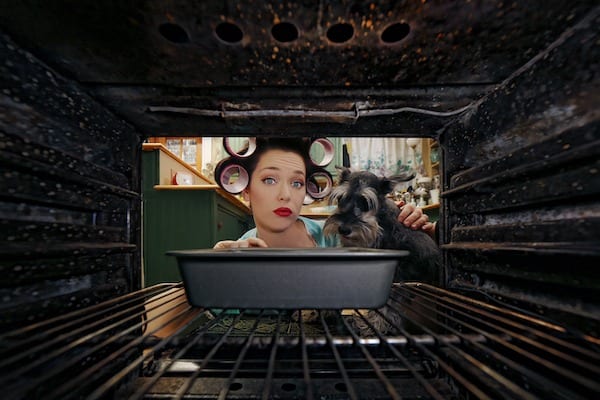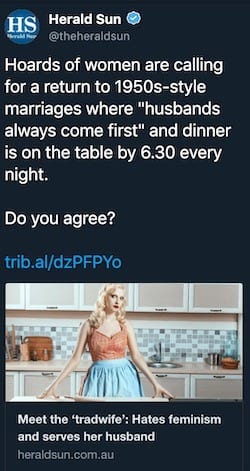We’re not convinced “Hoards of women” or even “hordes of women” are after such marriages.
But there may be a small, tiny and particularly social media savvy group that have the resources and the personal power to live that way.
The Sun Herald tweet came following Tory Shepherd’s story on the issue, in which she shares more on the “tradwives” (see the #TradWife hashtag) featured in a recent BBC documentary — the word being a mashup of the term “traditional wives”.
Shepherd says they’re women who “actively embrace subservience”. “It’s as though Jordan Peterson and Bettina Arndt got together and baked them out of red velvet cake dough. And put a cute little love heart on top.”
But as Shepherd also notes, the women leading this so-called “movement” are savvy and entrepreneurial, running sophisticated websites and publishing blogs, books and endless social media posts and updates on their lifestyles.
One key #Tradwife is Alena Kate Pettitt, from the United Kingdom, who tells the BBC that her role in the marriage is to submit to and spoil her husband, “like it’s 1959”.
Petitt still has time for publishing her own website at The Darling Academy, and has written a number of books.
As one piece on The Conversation notes on the trend, the Tradwife movement is being framed as a backlash against feminism — something the Sun Herald may have wanted to provoke in its “do you agree?” tweet.
The “tradwives vs feminists” is all too predictable, write Catherine Rottenberg and Shani Orgad, even before the Sun Herald tweet.
It fits the all-too-familiar trope of “catfighting” so often characterising conversations about feminist politics in the media. This framing, wittingly or unwittingly, identifies feminism as the problem, ignoring the larger structural issues at stake.
Rather than simply a backlash against feminism, the tradwife phenomenon needs to be understood as a symptom of – as well as a reaction to – the increasing insecurity of our times.
They go on to write about the role of the “always-on work culture” as being a factor in the rise of the retro-movement, as work overload combines with other factors to contribute. “Even relatively privileged women therefore find it difficult to live up to the popular feminist ideal of “work life balance”.
And the reality is that only a certain proportion of two-parent families will ever be in a position to have one parent staying home to manage the household for an extended period of time.
Not to disappoint the men who dream of returning to the 1950s, but could this micro-trend actually be just another way women are seeking to make their own choices? Perhaps even another way women are seeking to making a living on their own terms?
As 33 year old Stacy McCall said in the BBC documentary: “Being a tradwife is empowering and has enabled me to take back control of my life.”



